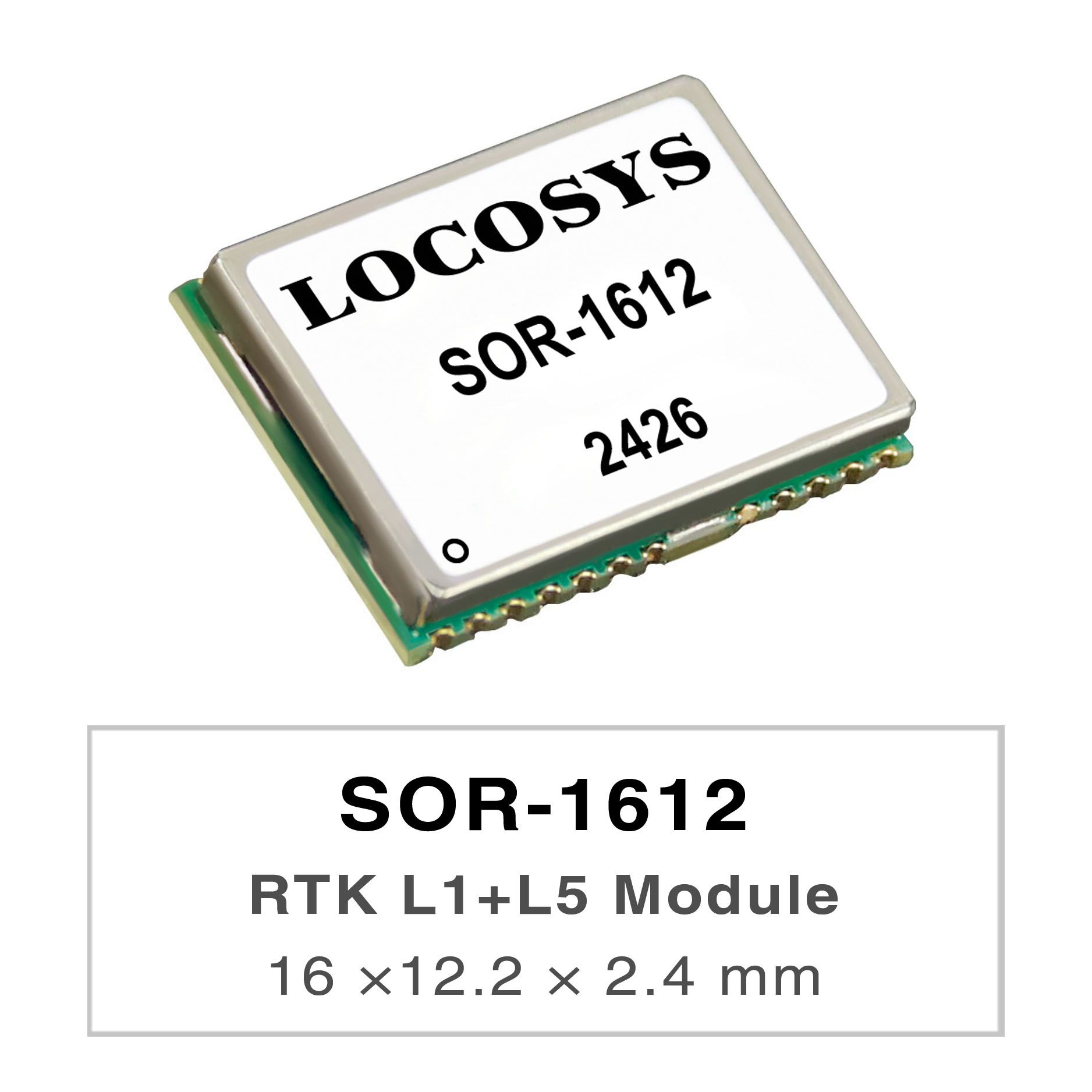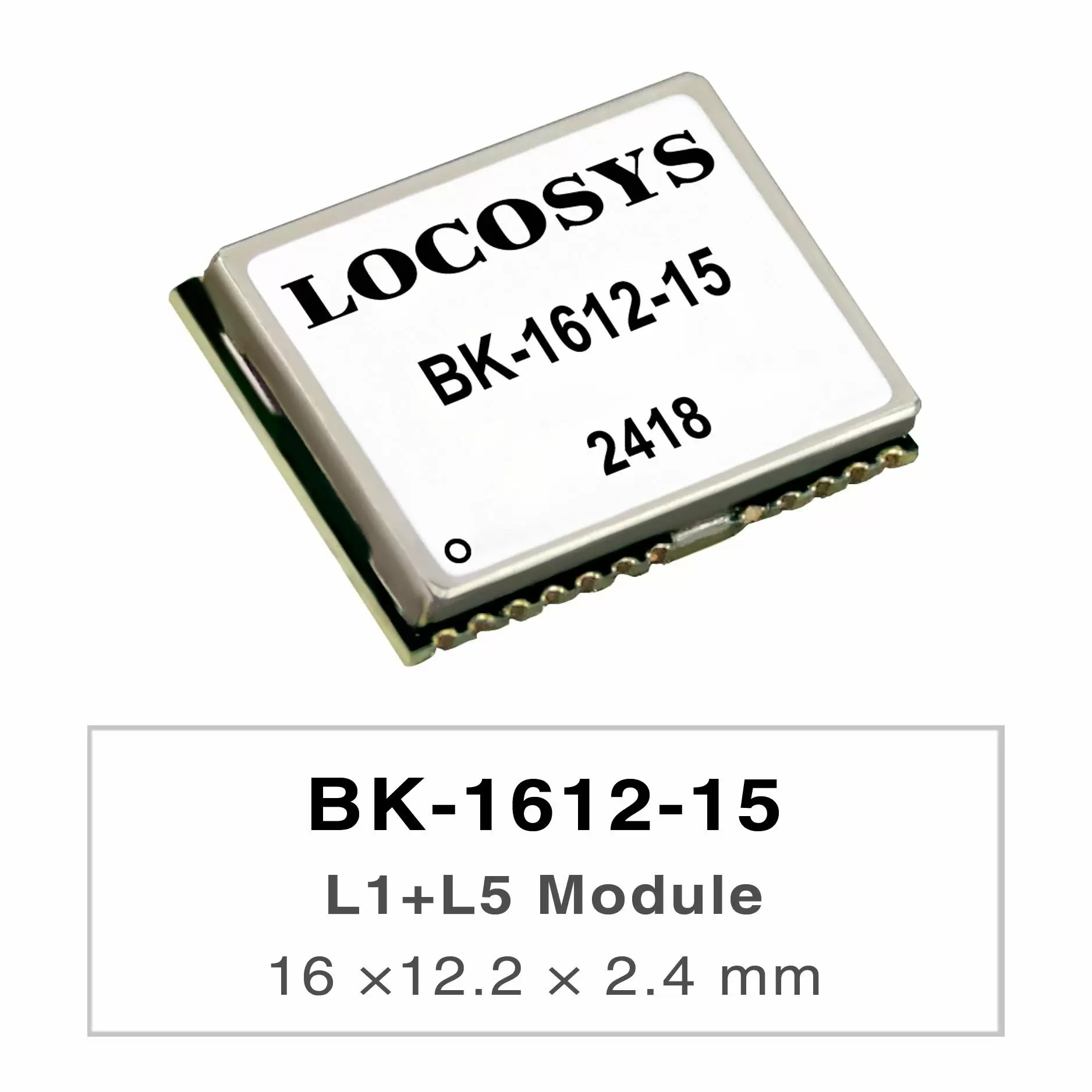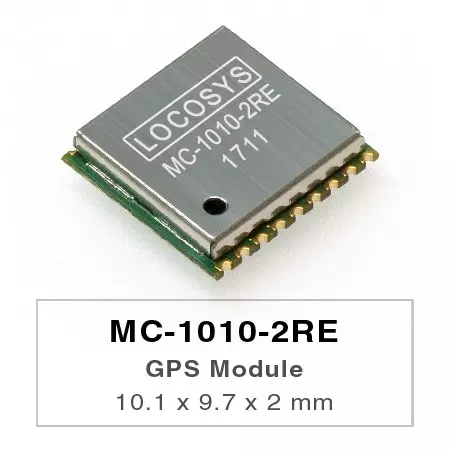
| | LOCOSYS MC-1010-2RE模組具有高精度,低功耗和超小尺寸。MC-1010-2RE 模組是使用聯發科最新的MT3337E GPS芯片,可為您提供卓越的靈敏度,甚至在城市高樓林立的環境下有絕佳的定位表現。
該模組支援自我生成軌道預測,EASY™以實現快速的冷啟動和暖啟動。EASY™不需要網絡協助和主機CPU的干預。
預測有效期最長為3天,當GPS模組上電且衛星可用時,亦會自動更新。 |
更多 |
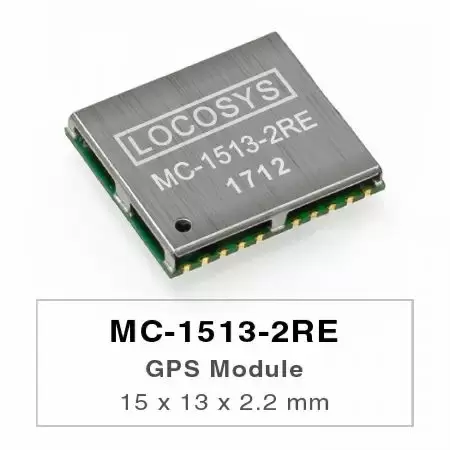
| | LOCOSYS MC-1513-2RE模組具有高精度,低功耗和超小尺寸的特性。該GPS模組由聯發科MT3337E芯片為基礎設計,即使在都市峽谷和茂密的樹葉環境中,也能提供卓越的靈敏度和性能。
其微型尺寸使模組成為易於整合至便攜式設備(如手機,PDA,攝像頭和車輛定位器)中的最佳方案。
支援自動生成軌道預測EASY™,實現更快的冷啟動和熱啟動。EASY™不需要網絡協助和主機CPU的干預。
該預測有效期最長為3天,GPS模組上電且衛星可用時,亦會自動更新。 |
更多 |
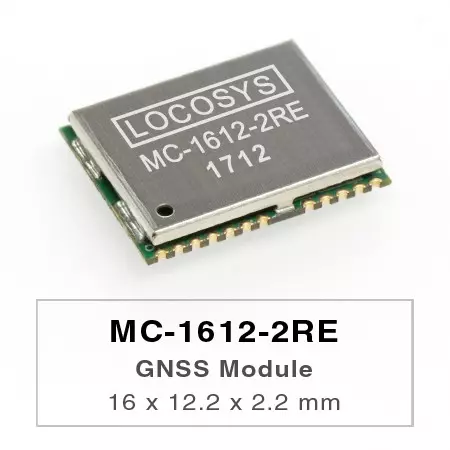
| | LOCOSYS MC-1612-2RE模組具有高感度,低功耗和超小尺寸。
該GPS模組由聯發科MT3337E芯片為基礎設計,即使在都市峽谷和茂密的樹葉環境中,它也能為您提供卓越的靈敏度和性能。
微型尺寸使模組變得簡單,是集成到便攜式設備(如手機,PDA,攝像頭和車輛定位器)中的最佳選擇。
該模組支援自動生成軌道預測,EASY#153;實現更快的冷啟動和熱啟動。 EASY#153;不需要網絡協助和主機CPU的干預。
該預測有效期最長為3天,GPS模組上電且衛星可用時,會自動更新。 |
更多 |
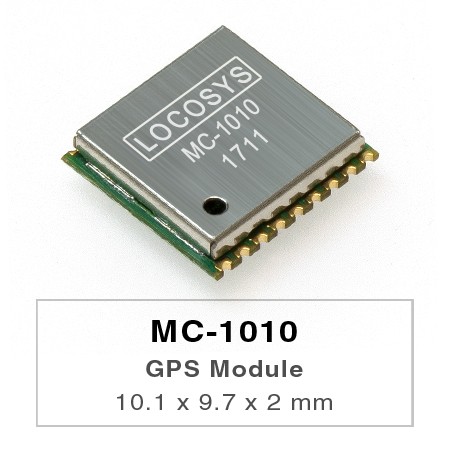
| | LOCOSYS GPS MC-1010模組具有高精度,低功耗和超小尺寸。 MC-1010
GPS模組使用聯發科GPS 多合一芯片MT3339,即使在其中也能為您提供卓越的靈敏度和性能都市峽谷和茂密的樹葉環境。該模組支援混合星曆預測,實現更快的冷啟動。
一個是自生產的星曆預測(稱為EASY),不需要網絡協助和主機CPU的干預。最多3天有效,GPS模組上電時會自動更新衛星可用。
另一個是服務器生成的星曆預測(稱為EPO)互聯網服務器 最多14天有效。 這兩個星曆預測都存儲在板載閃存中,冷啟動時間少於15秒。 |
更多 |
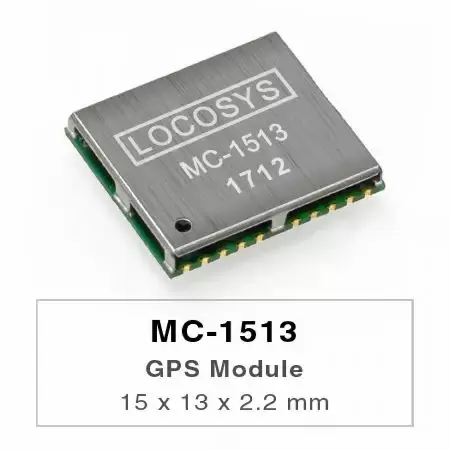
| | LOCOSYS MC-1513 GPS模組具有高精度,低功耗和超小尺寸。 MC-1513 GPS模組使用聯發科GPS 多合一芯片MT3339,即使在都市峽谷和茂密的樹葉環境中,它也能為您提供卓越的靈敏度和性能。
微型尺寸使模組簡化,是整合至便攜式設備(如手機,PDA,攝像頭和車輛定位器)中的最佳選擇。 |
更多 |
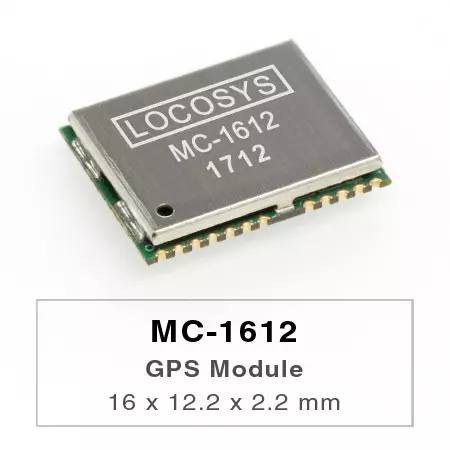
| | LOCOSYS GPS MC-1612模組具有高精度,低功耗和超小尺寸。MC-1612
GPS 模組使用聯發科GPS 多合一芯片MT3339,即使在都市峽谷和茂密的樹葉環境中,也能提供卓越的靈敏度和性能。該模組支援混合星曆預測,以實現更快的冷啟動。
一個是自生產的星曆預測,不需要網絡協助和主機CPU的干預, 有效期為3天,GPS模組上電和衛星不時自動更新可用。
另一個是從網路服務器獲得生成的星曆預測。有效期為14天。兩個星曆預測都存儲在板載閃存中,更讓執行冷啟動時間少於15秒。 |
更多 |
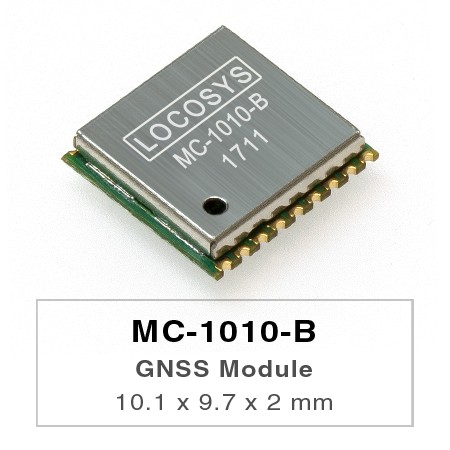
| | LOCOSYS MC-1010-B 採用聯發科先進的新一代MT3333 GNSS芯片。 它是一個完整的獨立GNSS模塊,可以同時獲取和追蹤包括GPS,BEIDOU,QZSS和SBAS在內的多個衛星系統。
它具有低功耗和小尺寸。 此外,即使在都市峽谷和茂密的樹葉環境中,它也能為您提供卓越的靈敏度和性能。該模組支援混合星曆預測,實現更快的冷啟動。 一個是自生產的星曆預測(self-generated ephemeris prediction稱為EASY),不需要網路協助和主機CPU的干預。
這最多可以持續3天,GNSS模組上電時會自動更新
衛星可用。 另一個是服務器生成的星曆預測(稱為EPO)
互聯網服務器 最多14天有效。 這兩個星曆預測都存儲在板載閃存中記憶並執行冷啟動時間少於15秒。 |
更多 |
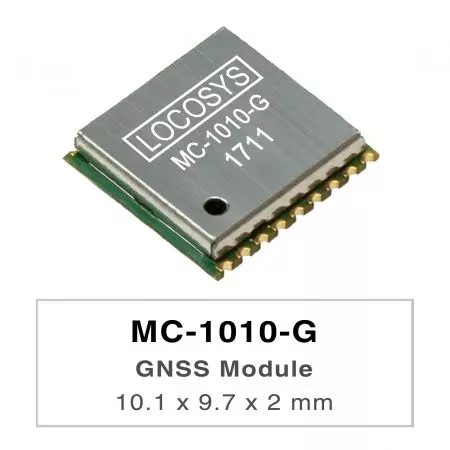
| | LOCOSYS MC-1010-G採用聯發科先進的新一代MT3333 GNSS芯片。 它是一個完整的獨立GNSS模塊,可以同時獲取和追蹤包括GPS,GLONASS,GALILEO,QZSS和SBAS在內的多個衛星系統。
它具有低功耗和小尺寸。 此外,它可以為您提供卓越的靈敏度
表現甚至在都市峽谷和茂密的樹葉環境中。
該模組支援混合星曆預測,實現更快的冷啟動。 一個是自生產的
星曆預測(self-generated ephemeris prediction稱為EASY),不需要網路協助和主機CPU的干預。
這最多可以持續3天,GNSS模組上電時會自動更新衛星可用。 另一個是服務器生成的星曆預測(稱為EPO)互聯網服務器 最多14天有效。 這兩個星曆預測都存儲在板載閃存中記憶並執行冷啟動時間少於15秒。 |
更多 |
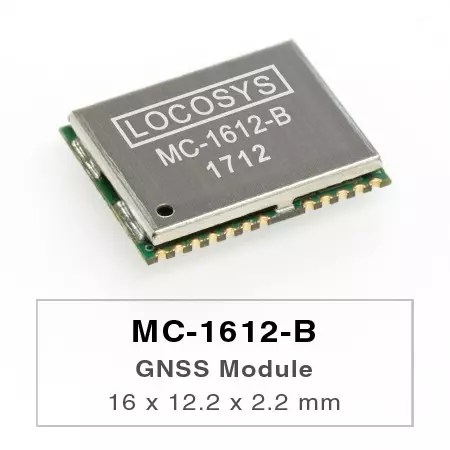
| | LOCOSYS MC-1612-B是一個完整的獨立GNSS模組,採用聯發科先進的新一代MT3333 GNSS芯片。 該模組可以同時獲取和追蹤包括GPS,BEIDOU,GALILEO,QZSS和SBAS在內的多個衛星系統。 它具有低功耗和小尺寸。 此外,即使在都市峽谷和茂密的樹葉環境中,它也能為您提供卓越的靈敏度和性能。
該模組支援混合星曆預測,實現更快的冷啟動。 一個是自生產的星曆預測(self-generated ephemeris prediction稱為EASY),不需要網路協助和主機CPU的干預。 這有效期最長為3天,當GNSS模組通電並且衛星可用時,會不時自動更新。 另一個是從互聯網服務器獲取的服務器生成的星曆預測(稱為EPO)。 最多14天有效。 兩個星曆預測都存儲在板載閃存中,並執行少於15秒的冷啟動時間。 |
更多 |
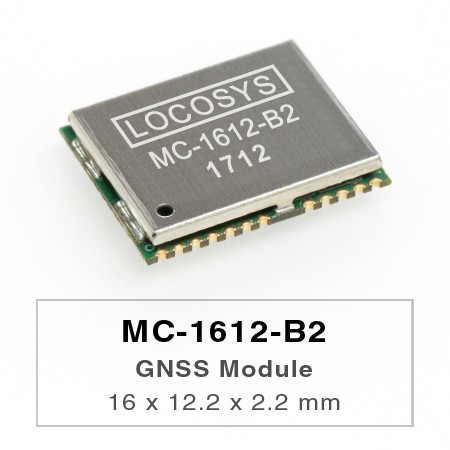
| | MC-1612-B2 採用聯發科先進的新一代MT3333 GNSS芯片。 它是一個完整的獨立GNSS模塊,可以同時獲取和追蹤包括GPS,BEIDOU,GALILEO,QZSS和SBAS在內的多個衛星系統。
此外,即使在都市峽谷和茂密的樹葉環境中,它也能為您提供卓越的靈敏度和性能。該模組支援混合星曆預測,實現更快的冷啟動。
一個是自生產的星曆預測(self-generated ephemeris prediction稱為EASY),不需要網絡協助和主機CPU的干預。 這有效期最長為3天,當GNSS模組通電並且衛星可用時,會不時自動更新。
另一個是從互聯網服務器獲取的服務器生成的星曆預測(稱為EPO)。 最多14天有效。 兩個星曆預測都存儲在板載閃存中,並執行少於15秒的冷啟動時間。 |
更多 |
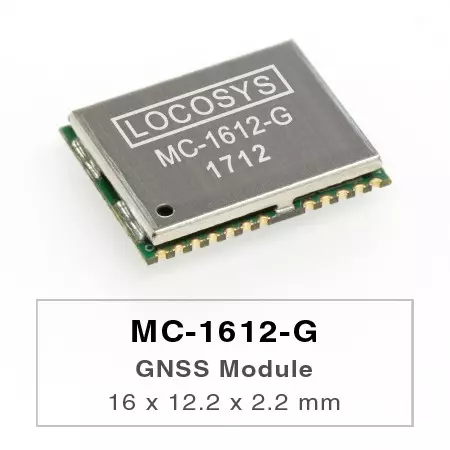
| | LOCOSYS MC-1612-G為獨立GNSS模組採用聯發科先進的新一代MT3333 GNSS芯片。 該模組可以同時獲取和跟踪包括GPS,GLONASS,GALILEO,QZSS和SBAS在內的多個衛星系統。它具有低功耗和小尺寸的產品特性。
此外,即使在城市峽谷和茂密的樹葉環境中,也能提供卓越的靈敏度和性能。該模組支援混合星曆預測,以實現更快的冷啟動。
一個是自生產的星曆預測(稱為EASY),不需要網絡協助和主機CPU的干預。有效期為3天,GNSS模組上電時會自動更新衛星可用。
另一個是服務器生成的星曆預測(稱為EPO) 最多14天有效。 這兩個星曆預測儲存於閃存中,並便於執行冷啟動時間少於15秒。 |
更多 |
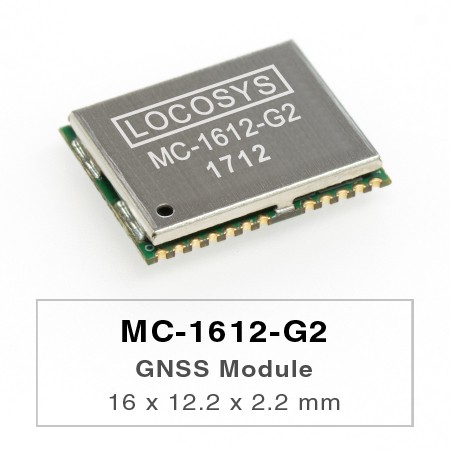
| | LOCOSYS MC-1612-G2為獨立GNSS模組採用聯發科先進的新一代MT3333 GNSS芯片。 此外,即使在城市峽谷和茂密的樹葉環境中,也能提供卓越的靈敏度和性能。該模組支援混合星曆預測,以實現更快的冷啟動。
一個是自生產的星曆預測(稱為EASY),不需要網絡協助和主機CPU的干預。有效期為3天,GNSS模組上電時會自動更新衛星可用。
另一個是服務器生成的星曆預測(稱為EPO) 最多14天有效。 這兩個星曆預測儲存於閃存中,並便於執行冷啟動時間少於15秒。 |
更多 |
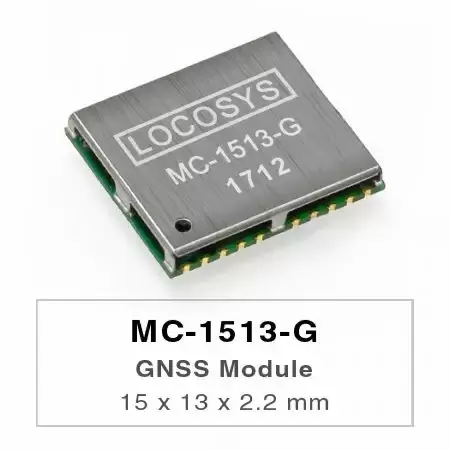
| | MC-1513-G採用聯發科先進的新一代MT3333 GNSS芯片。 它是一個完整的獨立GNSS模塊,可以同時獲取和追蹤包括GPS,GLONASS,GALILEO,QZSS和SBAS在內的多個衛星系統。
它具有低功耗和小尺寸。 此外,它可以為您提供卓越的靈敏度
表現甚至在都市峽谷和茂密的樹葉環境中。
該模組支援混合星曆預測,實現更快的冷啟動。 一個是自生產的星曆預測(self-generated ephemeris prediction稱為EASY),不需要網路協助和主機CPU的干預。
這有效期最長為3天,當GNSS模組通電並且衛星可用時,會不時自動更新。 另一個是從互聯網服務器獲取的服務器生成的星曆預測(稱為EPO)。 最多14天有效。 兩個星曆預測都存儲在板載閃存中,並執行少於15秒的冷啟動時間。 |
更多 |
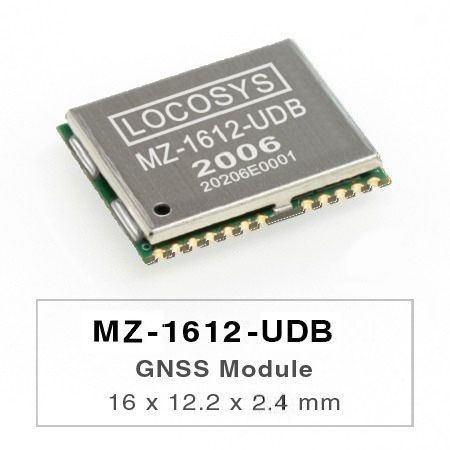
| | LOCOSYS MZ-1612-UDB 是一款完美的汽車應用解決方案,提供死 reckoning(DR)功能。MZ-1612-UDB 不僅支持 GPS 和北斗(BEIDOU),還配備了慣性傳感器(3軸加速度計和3軸陀螺儀)來實現死 reckoning。除此之外,它不需要與車輛里程計連接,並具備自動校準功能,使其易於使用。憑藉這些功能,MZ-1612-UDB 能夠在多徑環境中減少定位誤差,並能在 GNSS 信號較弱或無法接收的情況下繼續運行,例如隧道內或室內停車場,並提供無縫的車載導航。 |
更多 |
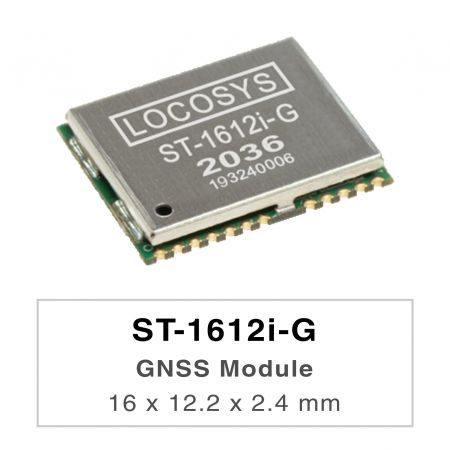
| | LOCOSYS ST-1612i-G 模組可以同時接收並跟蹤多顆衛星星座,包括 GPS、GLONASS、GALILEO 和 QZSS。該模組具有高靈敏度、低功耗和小型化的外形特點。即使在城市峽谷或密集樹葉環境中,ST-1612i-G 也能提供卓越的靈敏度和性能,確保穩定的定位服務。 |
更多 |
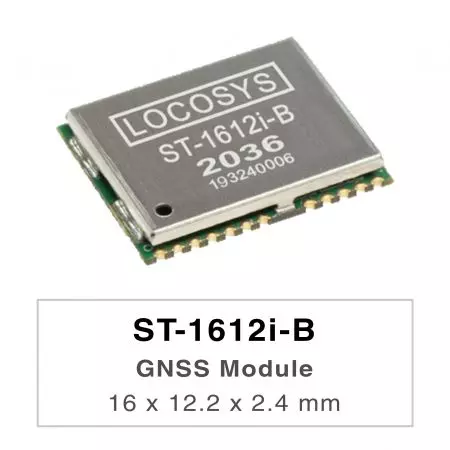
| | LOCOSYS ST-1612i-B 模組可以同時接收並跟蹤多顆衛星星座,包括 GPS、北斗(BEIDOU)、GALILEO 和 QZSS。該模組具有高靈敏度、低功耗和小型化外形。即使在城市峽谷或密集樹葉環境中,ST-1612i-B 也能提供卓越的靈敏度和性能,確保穩定的定位服務。 |
更多 |
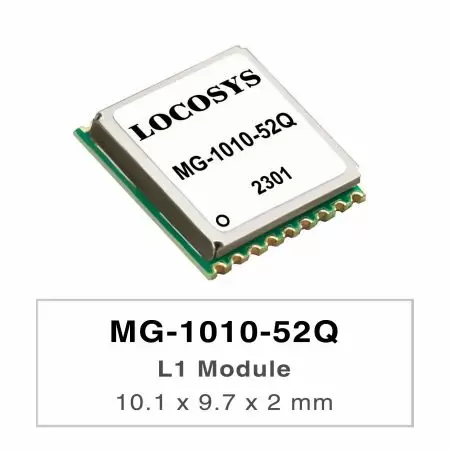
| | LOCOSYS MG-1010-52Q 是一款高性能的 GNSS 定位模組,能夠跟蹤所有全球民用導航系統,並支持新的 GPS L1C 和 BEIDOU B1C 信號。基於 Airoha AG3352 平台,MG-1010-52Q 可以同時接收並處理來自所有星系(GPS、GLONASS、BeiDou、Galileo 和 QZSS)的信號,結合 SBAS 的支持,顯著增加了可見衛星數量,並提高了定位精度。MG-1010-52Q 模組基於 ARM® Cortex®-M4 處理器,配備浮點單元(FPU)和內存保護單元(MPU),能夠集成單頻和多系統 GNSS RF 頻段。這一新設計的架構使得該單晶片在開闊天空下實現了 1.5 米 CEP 定位精度,較前代設備提升了 40%。其優異的冷啟動靈敏度使其能在信號弱的環境中自主獲取、跟蹤並修正位置。此外,該模組卓越的跟蹤靈敏度能在幾乎所有戶外應用環境中提供持續的定位覆蓋。 |
更多 |
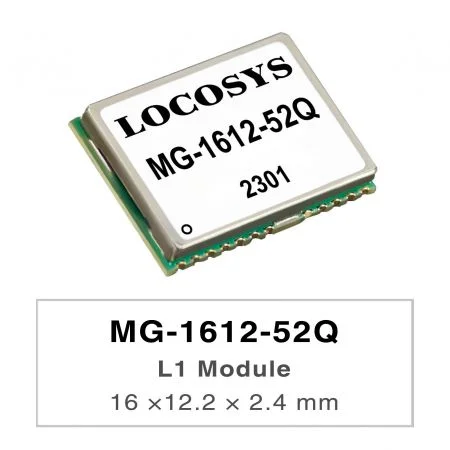
| | LOCOSYS MG-1612-52Q 是一款高性能 GNSS 定位模組,能夠跟蹤所有全球民用導航系統,並支持新的 GPS L1C 和 BEIDOU B1C 信號。基於 Airoha AG3352 平台,MG-1612-52Q 可以同時接收並處理來自所有星系(GPS、GLONASS、BeiDou、Galileo 和 QZSS)的信號,結合 SBAS 的支持,顯著增加了可見衛星數量並提高了定位精度。MG-1612-52Q 模組基於 ARM® Cortex®-M4 處理器,配備浮點單元(FPU)和內存保護單元(MPU),能夠集成單頻和多系統 GNSS RF 頻段。這一新設計的架構使得該單晶片在開闊天空下實現了 1.5 米 CEP 定位精度,較前代設備提升了 40%。其優異的冷啟動靈敏度使其能在信號弱的環境中自主獲取、跟蹤並修正位置。此外,該模組卓越的跟蹤靈敏度能在幾乎所有戶外應用環境中提供持續的定位覆蓋。 |
更多 |
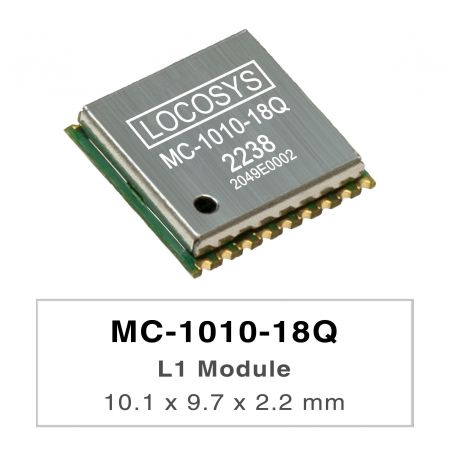
| | LOCOSYS MC-1010-18Q 是一款高性能 GNSS 定位模組,能夠跟蹤所有全球民用導航系統,並支持新的 GPS L1C 和 BEIDOU B1C 信號。基於 Airoha AG3352 平台,MC-1010-18Q 可以同時接收並處理來自所有星系(GPS、GLONASS、BeiDou、Galileo 和 QZSS)的信號,結合 SBAS 的支持,顯著增加了可見衛星數量並提高了定位精度。該模組能實現 1.5 米 CEP(開闊天空)定位精度,比前代設備提高了 40%。其優異的冷啟動靈敏度使其能在信號較弱的環境中自主獲取、跟蹤並修正位置。此外,該模組卓越的跟蹤靈敏度能在幾乎所有戶外應用環境中提供持續的定位覆蓋。MC-1010-18Q 模組支持混合星歷預測功能,以實現更快的冷啟動。其星歷預測有兩種方式:一種是自生成星歷預測(稱為 EASY),無需網絡輔助或主機 CPU 介入,該方式在 GNSS 模組開機且有衛星可用時會自動更新,並且有效期長達 3 天;另一種是從互聯網服務器獲取的伺服器生成星歷預測(稱為 EPO),其有效期為 14 天。這兩種星歷預測都存儲在模組內建的閃存中,並可實現小於 15 秒的冷啟動時間。該模組的快速 GNSS 定位使得無論在何時何地,都能以較小的功率預算使用精確的定位和導航服務。它還提供成本優化版本以及低功耗版本,並支持在健身模式和正常導航模式下的自適應低功耗(ALP)功能。 |
更多 |
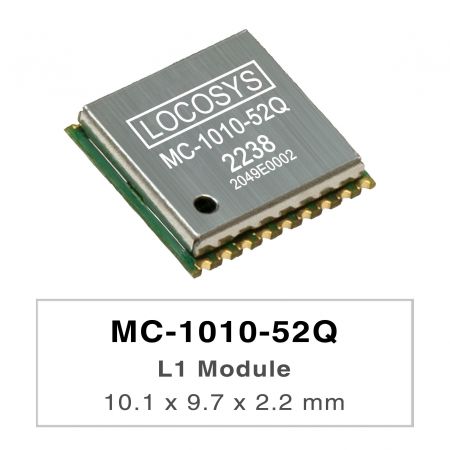
| | LOCOSYS MC-1010-52Q 是一款高性能 GNSS 定位模組,能夠追蹤所有全球民用導航系統,並支持新的 GPS L1C 和 BEIDOU B1C 信號。基於 Airoha AG3352 平台,MC-1010-52Q 可以同時接收並處理來自所有星系(GPS、GLONASS、BeiDou、Galileo 和 QZSS)的信號,並結合 SBAS 的支持,顯著增加可見衛星的數量並提高定位精度。該模組能夠實現 1.5 米 CEP(開闊天空)定位精度,比前代設備提高了 40%。其卓越的冷啟動靈敏度使其能夠在信號較弱的環境中自主獲取、跟蹤並修正位置。此外,該模組的優異跟蹤靈敏度能在幾乎所有戶外應用環境中提供持續的定位覆蓋。MC-1010-52Q 模組支持混合星歷預測功能,以實現更快的冷啟動。其星歷預測有兩種方式:一種是自生成的星歷預測(稱為 EASY),無需網絡輔助或主機 CPU 介入,該方式在 GNSS 模組啟動且有衛星可用時會自動更新,有效期長達 3 天;另一種是從互聯網服務器獲取的伺服器生成星歷預測(稱為 EPO),有效期為 14 天。這兩種星歷預測都存儲在模組內建的閃存中,並實現小於 15 秒的冷啟動時間。該模組的快速 GNSS 定位使得隨時隨地都能以較小的功率預算提供精確的定位和導航服務。它提供了成本優化版本以及低功耗版本,並支持在健身模式和正常導航模式下的自適應低功耗(ALP)功能。 |
更多 |
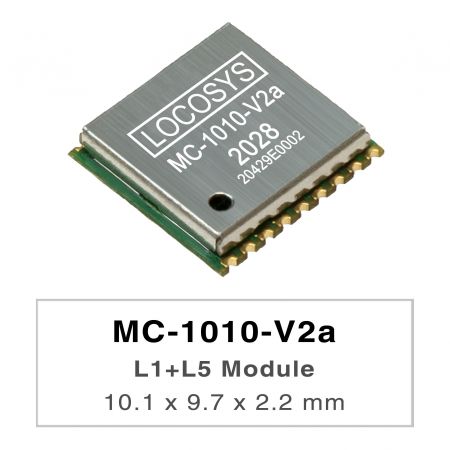
| | LOCOSYS MC-1010-Vxx 系列是高性能的雙頻 GNSS 定位模組,能夠追蹤所有全球民用導航系統。它採用了 12nm 處理工藝並集成高效的電源管理架構,實現低功耗和高靈敏度。此外,同時接收 L1 和 L5 頻段信號,可減少多徑延遲,並實現亞米級定位精度。該模組支持混合星曆預測技術,以實現更快速的冷啟動。其一是自生成星曆預測(稱為 EPOC),不需要網路支援和主機 CPU 的干預,預測有效期為最多 3 天,並會在 GNSS 模組開機並且衛星可用時自動更新。另一種是伺服器生成的星曆預測(稱為 EPO),從互聯網伺服器獲取,有效期為最多 14 天。這兩種星曆預測均儲存在板載閃存中,並可在 15 秒內完成冷啟動。MC-1010-V3x 模組搭配有源天線,能夠符合 AIS 140 標準中的靈敏度規範,是設計符合 AIS 140 跟蹤應用的客戶的最佳解決方案。 |
更多 |
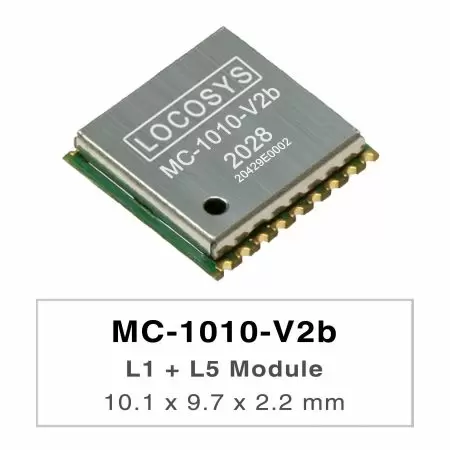
| | LOCOSYS MC-1010-Vxx 系列是高性能的雙頻 GNSS 定位模組,能夠追蹤所有全球民用導航系統。它採用了 12nm 處理工藝並集成高效的電源管理架構,實現低功耗和高靈敏度。此外,同時接收 L1 和 L5 頻段信號,可減少多徑延遲,並實現亞米級定位精度。該模組支持混合星曆預測技術,以實現更快速的冷啟動。其一是自生成星曆預測(稱為 EPOC),不需要網路支援和主機 CPU 的干預,預測有效期為最多 3 天,並會在 GNSS 模組開機並且衛星可用時自動更新。另一種是伺服器生成的星曆預測(稱為 EPO),從互聯網伺服器獲取,有效期為最多 14 天。這兩種星曆預測均儲存在板載閃存中,並可在 15 秒內完成冷啟動。MC-1010-V3x 模組搭配有源天線,能夠符合 AIS 140 標準中的靈敏度規範,是設計符合 AIS 140 跟蹤應用的客戶的最佳解決方案。 |
更多 |
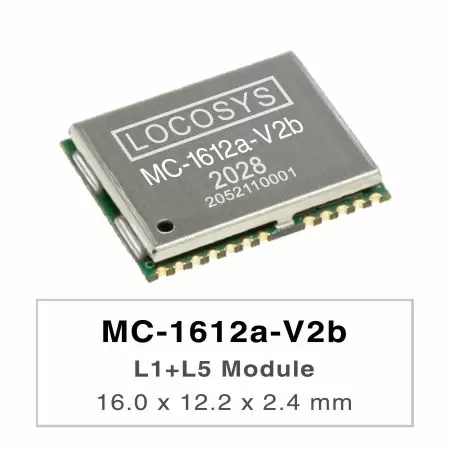
| | LOCOSYS MC-1612-Vxx 系列是高性能的雙頻 GNSS 定位模組,能夠追蹤所有全球民用導航系統。它採用了 12nm 處理工藝並集成高效的電源管理架構,實現低功耗和高靈敏度。此外,同時接收 L1 和 L5 頻段信號可減少多徑延遲,實現亞米級的定位精度。該模組支持混合星曆預測技術以實現更快速的冷啟動。其一是自生成星曆預測(稱為 EPOC),無需網絡協助和主機 CPU 的干預,有效期長達 3 天,並會在 GNSS 模組開機且衛星信號可用時自動更新。另一種是伺服器生成的星曆預測(稱為 EPO),通過互聯網伺服器獲取,有效期為最多 14 天。這兩種星曆預測均儲存在板載閃存中,並可實現低於 15 秒的冷啟動時間。MC-1612-V3b 模組的射頻前端設計專門符合 AIS 140 標準中的靈敏度規範,是設計符合 AIS 140 跟蹤應用的客戶的最佳解決方案。 |
更多 |
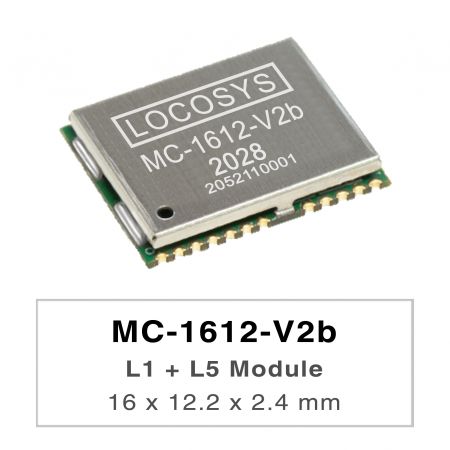
| | LOCOSYS MC-1612-Vxx 系列是高性能的雙頻 GNSS 定位模組,能夠追蹤所有全球民用導航系統。它採用了 12nm 處理工藝並集成高效的電源管理架構,實現低功耗和高靈敏度。此外,同時接收 L1 和 L5 頻段信號可減少多徑延遲,實現亞米級的定位精度。該模組支持混合星曆預測技術以實現更快速的冷啟動。其一是自生成星曆預測(稱為 EPOC),無需網絡協助和主機 CPU 的干預,有效期長達 3 天,並會在 GNSS 模組開機且衛星信號可用時自動更新。另一種是伺服器生成的星曆預測(稱為 EPO),通過互聯網伺服器獲取,有效期為最多 14 天。這兩種星曆預測均儲存在板載閃存中,並可實現低於 15 秒的冷啟動時間。MC-1612-V3b 模組的射頻前端設計專門符合 AIS 140 標準中的靈敏度規範,是設計符合 AIS 140 跟蹤應用的客戶的最佳解決方案。 |
更多 | 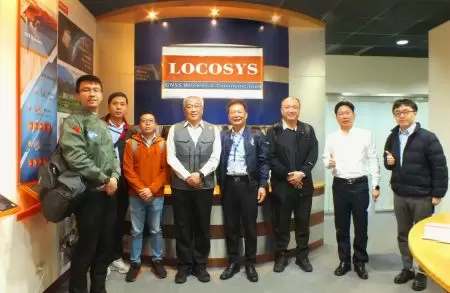 台灣卓越無人機聯盟參訪大辰科技領先企業 聚焦全球定位技術與無人機應用
台灣卓越無人機聯盟參訪大辰科技領先企業 聚焦全球定位技術與無人機應用 LOCOSYS 大辰科技參加新北電動車產業鏈博覽會 展現領先智慧定位技術
LOCOSYS 大辰科技參加新北電動車產業鏈博覽會 展現領先智慧定位技術 LOCOSYS 大辰科技 推出全新高性能 SONY (GNSS/RTK) 全球衛星定位模組
LOCOSYS 大辰科技 推出全新高性能 SONY (GNSS/RTK) 全球衛星定位模組
